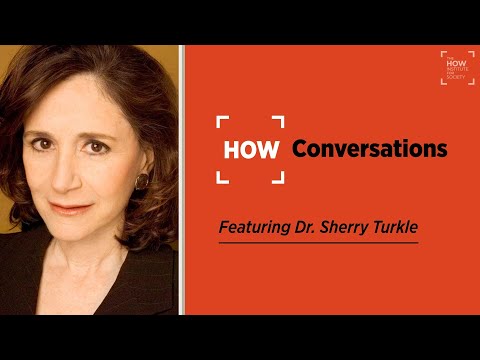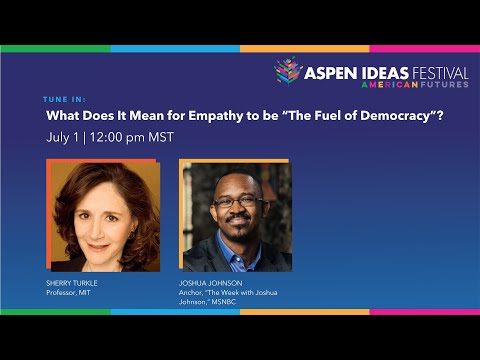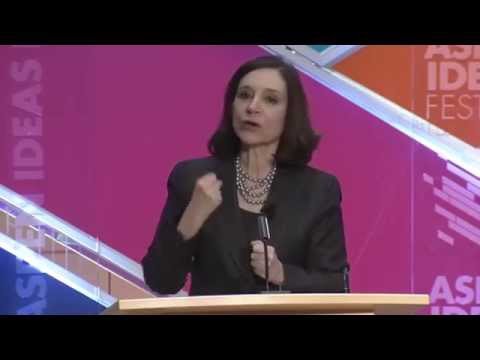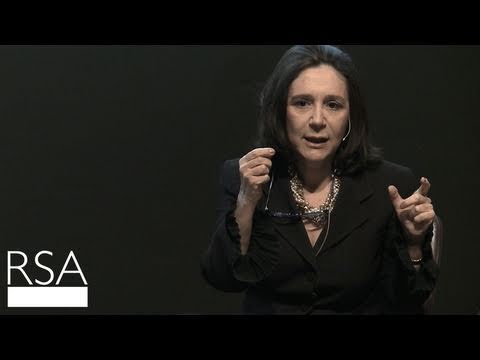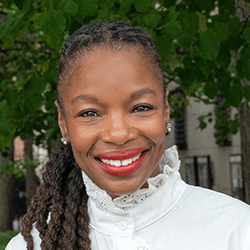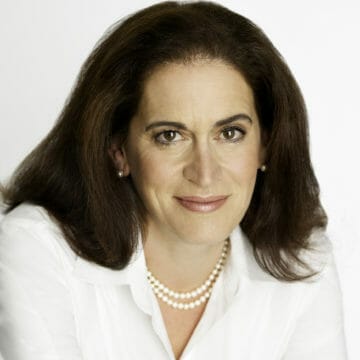Videos
Learn More About Sherry Turkle
We marvel at the new connections enabled by our digital devices. Yet they also create barriers to creativity and collaboration in the workplace and inhibit communication in personal relationships. If we are always thinking about our phones, we cannot be fully present to each other, says MIT sociologist and New York Times bestselling author Sherry Turkle.
Since the early days of the personal computer revolution, Turkle has sounded the alarm about technology’s role in undermining human empathy. This begins with its assault on the capacity for solitude, the place where empathy is born.
“To activate empathy, we need to create spaces where people can disagree on ideas while developing an understanding of other viewpoints,” says Turkle. “We know that conversations are limited by our prejudices as much as by our distractions. Empathy doesn’t begin with, ‘I know how you feel.’ It starts with the realization that you don’t know how another feels. In that ignorance, you start with an offer of conversation.”
Turkle – who is often referred to as the “Margaret Mead of digital culture” – has taught us how technology changes not just what we do but who we are. In her latest book, “The Empathy Diaries: A Memoir” (Penguin Books, March 2021), which was named a top book of 2021 by The New York Times staff critics, she examines how technology can both enhance our connections to each other but also get in the way, at home, in school, and in our business life. “Among other things,” she says, “our devices offer the illusion of companionship without the demands of intimacy or the challenges of empathy.”
Since the publication of her New York Times bestseller, “Reclaiming Conversation: The Power of Talk in a Digital Age” (Penguin Books, 2015), Turkle has been moving from research on conversation to helping people cultivate empathy through participation and engagement. Part of that work has her conducting workshops for organizations, schools, and community groups. She believes empathy is a necessary component of citizenship. In our divided country, she says, we need to learn new techniques for listening to and engaging with each other.
As an advisor, speaker, and author, Turkle teaches leaders and employees in every sector how to strike a balance between leveraging the best of technology while maintaining healthy levels of engaged human interactions. Her insights around building sensitivity and fostering constructive communication “offscreen” give organizations the tools they need to build a more productive, innovative and inclusive culture.
# # #
Sherry Turkle is the Abby Rockefeller Mauzé Professor of the Social Studies of Science and Technology in the Program in Science, Technology and Society at MIT. She is the founding director of the Initiative on Technology and Self, a center of research and reflection on the evolving connections between people and artifacts.
Her 2011 book, “Alone Together: Why We Expect More from Technology and Less from Each Other” (Basic Books, 2011) sounded an early warning about the human costs of too much digital communication in our lives. It became the subject of a featured TED Talk in 2012, which has received more than 6 million views.
Turkle has been profiled in such publications as The New York Times, Scientific American and WIRED, and has been a featured commentator on CNN, NBC, ABC and NPR. She has also appeared on Nightline, 20/20 and The Colbert Report. She is a member of the American Academy of Arts and Sciences, she is a Harvard Centennial Medalist, and she has been a Ms. Magazine Woman of the Year.
She received a joint doctorate in sociology and personality psychology from Harvard University and is a licensed clinical psychologist.
Sherry Turkle is available to advise your organization via virtual and in-person consulting meetings, interactive workshops and customized keynotes through the exclusive representation of Stern Speakers & Advisors, a division of Stern Strategy Group®.
Improving Professional and Personal Relationships and Healing Social Divisions by Consciously Practicing Empathy
According to a recent viral Forbes article, empathy is a critical tool for business leadership and a key ingredient for keeping workers engaged and creative. Yet so many current-day forces undermine empathy. Our economic system and its pressures are dehumanizing and overwhelming. Capitalism is a machine that wants people in it to be interchangeable machine parts. Beyond all this, the algorithms that underlie social media are built to engage us by keeping us angry and in silos where we speak only to people with whom we agree. “Social media is an anti-empathy machine,” laments renowned MIT sociologist and New York Times bestselling author Sherry Turkle, a globally recognized authority on building empathy and improving relationships offscreen in an era dominated by technology. “The current assault on empathy puts us in danger, individually and in our communal life.”
In this timely and urgent talk, Professor Turkle explains why an erosion of empathy – mainly due to the impact of technology on how we communicate – has caused people and societies to lose their way. She discusses how, even before the pandemic, our tech-saturated culture was negatively affecting our work and social lives, causing divisions, and making people feel alienated, isolated and depressed. Drawing on her extensive research, as well as lessons she’s learned from personal experiences, she teaches her “4-Es” framework for reclaiming empathy, to help us understand how empathy works, why it’s so important, and how we can nurture and protect it. Her simple yet powerful approach provides an avenue for consciously practicing empathy within our workplaces, communities and families so we can strengthen our relationships offscreen, and eventually restore what’s been lost to technology – more importantly, to help our children do the same so they become more empathetic, conscious adults.
From Empathy to Engagement: How to Build a More Productive Workplace
For decades, MIT Professor Sherry Turkle has been warning us about the dangers of allowing digital exchanges to overshadow face-to-face conversations. Her research shows that communicating through devices inhibits a person’s ability to develop empathy and, without empathy, everything suffers – from our homelife to our workplaces. So, in an era dominated by digital communications, conversation must be cultivated. In this presentation, in which she draws on her latest book, “The Empathy Diaries,” Turkle discusses how we are at a point where we have the tools to be deliberate in our use of technology as we honor the importance of non-digital conversations in building a culture of empathy. In her discussion of workplace dynamics, she helps bridge the divide between senior management and younger members of the organization who are often reluctant to converse outside the digital realm. Beyond the organization, Professor Turkle explains why empathy needs to be part of a new definition of citizenship in our time of unprecedented political and social division. She explores a way of seeing empathy that is not passive but an active and civically engaged endeavor.
How to Be the Empathy App to Bridge the Empathy Gap
We are living in a time where empathy – the ability to understand and share the feelings of others – is under assault. The empathy “gap” is widening in many societies around the world. Among college age students, studies conducted over a 30-year period have shown a 40% decline, with most of the drop coming after 2000. A generation has grown up believing it is possible to share our attention during almost everything we do and feeling that we “would rather text than talk.” What are the costs of a “flight from conversation” in personal life, among one’s family and friends? What are the costs in the business world? And most importantly, what can we do about it? Sherry Turkle believes technology has offered the illusion of companionship without the demands of friendship and then – as it got really good – the illusion of friendship without the demands of intimacy. While we have always known that only people can be empathic, we only really get good at it with our full attention to each other.
To Increase Creativity and Productivity, Be an Empathic Organization
One of the realities of corporate life is that office technology leads us to make a Faustian bargain with everyday office technology: What we gain from efficiency and responsiveness is compromised by what we lose because of the isolation, disengagement and distraction that comes with digital life. Sherry Turkle calls our work dilemma that of “pilots in the cockpit.” Often, we are too busy communicating online to have the conversations that count – on the phone or face-to-face. At every level, people craft ways to move phone or in-person conversations to screens on which they feel less vulnerable and more in control.
Turkle makes an impassioned case for companies to pivot back to conversation-based interactions that spur fully formed relationships. Ultimately, the aim is to become an organization that values empathy, authenticity and engagement. When employees recognize the difference between relational and transactional encounters, they can place a higher value on the former and build better relationships with clients and co-workers. The empathic organization understands that the capacity for solitude, and for relationship and conversation go together. With these underpinnings, employees will be more effective at establishing and maintaining relationships as they develop a competence for attention and focus. They will thrive – and so will your business.
The Chatbot I've Loved to Hate
August 18, 2020
Why These Friendly Robots Can't Be Good Friends To Our Kids
December 7, 2017
A Robot Is Not A Best Friend (Video)
November 29, 2017
What Can You Learn from Watching the People Around You? (Audio)
February 15, 2017

Alone Together: Why We Expect More from Technology and Less from Each Other
(Basic Books, January 2011)
Reclaiming Conversation® Advisory Services
Our increased reliance on digital technology has brought us out of balance with what we need as people: rich, robust and trusting relationships. In the workplace, technology is too often part of a flight from face-to-face conversation. Yet, it is through conversation that the relationships and ideas that underlie successful enterprises are born and thrive.
Beyond traditional talks, lectures and workshops about why and what it takes to be a conversational organization, Sherry Turkle advises individuals and organizations on how to become one – through hands-on, immersive collaboration. A trusted advisor and master of implementation, she is an extension of your team. In short order, she identifies what’s most relevant to your business, diagnosing critical issues and opportunities that inform her prescriptive, unique-to-you solutions. Sherry’s research is in-depth; her recommendations are robust yet practical.
Sherry applies decades of proven research alongside her Reclaiming Conversation® framework and tools to help you – and your leaders and their teams – change behavior. Her expert counsel pinpoints the policies, procedures and programs required to make change real and workable within your organization.
Reclaim conversation within your organization – and/or with your customers and the world at large. Talk to Sherry about how she can become part of your team and dial-in to what it will take to make change happen for your business.
“The audience loved her. Lots of good tweets about her talk, and relevance to our field”
“A beautifully wrought memoir about how emerging technology makes us think and feel [. . .] Anyone who studies, develops, or produces technology—and anyone who uses it—will gain crucial insights from this profound meditation on how technology is changing us. A masterful memoir by a pioneering researcher and incisive thinker.”
“[R]evelatory and forthright . . . Turkle’s candor and transparency are totally in keeping with her personal and professional commitment to understanding human emotional motivation and our capacity for empathy, not only towards others but also towards ourselves.”
“ [R]ichly detailed . . . Anyone who has felt the struggle to fit in will identify with [Turkle’s] story.”
“Since digital culture became part of our intimate lives, Sherry Turkle has helped us understand our complex, evolving dance with technology, using the power of data and analysis. Now, with raw and refreshing authenticity, she shares her personal journey, which serves as a powerful and poignant reminder that it is in our relationships with one another—not technology—that we find our most important source of meaning and healing.”
“In this beautiful, compulsively readable memoir, Sherry Turkle, who has asked why we expect ‘more from technology and less from each other,’ excavates the eras of her continually surprising 20th century life. In her hands, empathy is the instrument of knowledge, illuminating the uses and pleasures of crucial human values now under threat. This is the story not only of a woman but of her humane and exhilarating mind.”
“Sherry’s life story is that of a woman who made her own way—both in the academic world and in the larger cultural conversation—by following her passions without fear and with tremendous integrity. In so doing, she has helped us all understand a vital aspect of our lives with much greater clarity. “The Empathy Diaries” is a case study in courage and where it can take us.”
“Over the decades, Sherry Turkle has provided the most penetrating analyses of the relations between the human and the computational worlds. In a remarkably revealing memoir Turkle explores the personal as well as scholarly sources of her understandings and, in the process, provides a brilliant panorama of our time.”
“Sherry Turkle’s memoir is a page-turner, and I was so drawn in by its vivid narrative and exquisitely drawn characters that it took me a while to realize that this is also a strikingly original book about empathy. Her searing encounters with a stark lack of empathy in two of the most important men in her life—her scientifically driven father and renowned first husband—led her to the discovery that empathy is not simply an interesting research topic or ‘feminine’ virtue but, as it became for her, a ‘strategy for survival.’ The Empathy Diaries is a magnificent capstone to Sherry Turkle’s studies of the human costs of our romance with technology. Drawing on firsthand experience, she shows us how empathy is a lifesaving necessity in human relations and, potentially, a key to our survival as a species.”
“In this brilliantly integrated memoir, Sherry Turkle traces her metamorphosis from the gifted child of a disturbed man to the preeminent ethnographer of digital culture. One part intellectual history, one part daddy dearest, one part portrait of the critic as a young woman, this is a one-of-a-kind page-turner. Bravo!”
“I’ve long marveled at the remarkable and inspiring career of Sherry Turkle. Her path, so courageously interdisciplinary, has been strewn with dazzling insights. And now, in just the kind of brave and brilliant memoir one would expect from her, she gives us her personal story, explaining how, in a mind like hers, the deeply personal is transformed into ideas that can be shared by us all.”
“This is a scintillating memoir. Turkle acts at once as storyteller, ethnographer, and psychologist of her own life—one stretching from a straitened Brooklyn Jewish girlhood shadowed by an unspeakable secret to a womanhood of academic accomplishment amidst the excitements of Radcliffe, Harvard, Chicago, Paris in the years after the upheaval of ’68 and MIT just as our computer world is born. Along the way she gives us a vivid account of ideas crucial to the last half-century of intellectual life, tracing their inner history with bracing clarity.”
“By respecting her own emotional, social, and intellectual history with careful—even loving—attention, Sherry Turkle shows what rescue from the crisis of technological disconnect looks like. Intimate, compassionate, and critical, her book instructs, edifies, and heals. A paradigmatic personal narrative, yet The Empathy Diaries is a tour de force of social science, saluting and protecting the precious intangibility that no machine can match—the quality that makes us human.”
“Like a Harvard educated Nancy Drew, Sherry Turkle searches her past for clues to her true self and hits the mother lode in this fascinating, fearless memoir. Her struggle with the legacy of long-held family secrets as she forges her own unique path to authenticity and forgiveness is a story countless women will identify with. Reading The Empathy Diaries, I felt my mind—and my heart—expanding. Sherry Turkle is not only a great writer and teacher—she’s great company.”
“‘Use concrete events to think about large ideas. Use large ideas to think about concrete events.’ Sherry Turkle follows the advice of her professor, Samuel Beer, and The Empathy Diaries is the compelling result. The stages of Turkle’s narrative unfold so gracefully, in prose of such candor and clarity, that it’s easy to overlook how many tasks this memoir performs. The Empathy Diaries is about a childhood and a coming of age. It’s about a courtship and marriage. It’s also about the progress of Turkle’s engagement in the dynamic and overlapping fields in which this professor of social sciences, science, and technology is a crucial, authoritative, and, yes, empathetic voice. In every way, this is a book about an education. Fans of Turkle’s earlier work will certainly want to read The Empathy Diaries; but so too should everyone struggling in the cyber maze in which we find ourselves. A remarkable book.”
“I read it with delight. An honest, insightful, compelling, and sometimes painful account of the intellectual and emotional forces that shaped Turkle into a pioneer in the study of digital culture and how computers change the way we think about ourselves. Turkle’s is not only a personal story, but also a story of our digital age.”
“Sherry Turkle has been daring and original for a long time—bearing witness to the emergence of artificial intelligence but also writing forcefully, while surrounded by true believers at MIT, about its limitations. In “The Empathy Diaries,” she dares even further by investigating a tightly held family secret, affirming in the process the wisdom of the human heart. “The Empathy Diaries” tells a fascinating story—one that manages to be profound and entertaining at the same time.”

